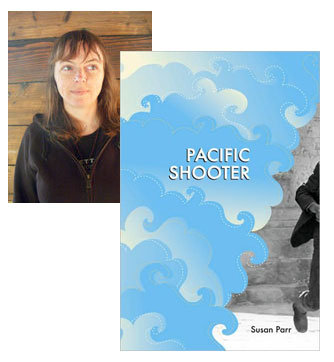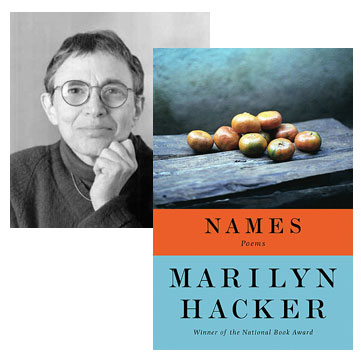Susan Parr, “Untitled”

No skill to sorting rice.
The ways are multiform—
even the urge to decide on one pulls the grain.So here’s advice:
pour wherever the scoop leads your arm,
pronouncing the name of someone-syllable thing, like “sky,”
making a tiny screen
for the free-falling.
Pacific Shooter, the debut collection from Susan Parr, was the 2009 winner of the Lena-Miles Wever Todd Poetry Series prize. Poems from this collection include “Formal Manners” and “This Is Not a Lemon” (published in DIAGRAM), “Even Football” (reprinted in The Stranger) and “Poem in the Shape of a Poem” and “Brandoid Roundteen” (discussed at Incendiary Lit).
7 April 2011 | poetry |
Marilyn Hacker, “Ghazal: Myself”

They say the rules are: be forgotten, or proclaim myself.
I’m reasonably tired of that game, myself.I watched some friends rush off, called by the wild,
and stayed home to make coffee for the tame myself.There are actions I was pressured or seduced to,
but for omissions, I can only blame myself.Do I think that my averted glance
nullifies suffering? First of all, I maim myself.Did sex ever seem like work to you?
Sometimes, five minutes after I came myself.Although I’m manifestly “not my type”
the one in my bed this morning was, all the same, myself.Not Elektra, Clytemnestra, nor Iphigenia,
I’ll remain an unsung keeper of the flame myself.Burnished oak surrounds a rectangle of glass
at the top of the stairs, in which I frame myself.A signature hangs, unwritten, below the last
line on the page, where I’m obliged to name myself.
Names is the most recent collection from National Book Award winner Marilyn Hacker. The title poem appeared in The New Yorker; other poems in the collection include “Glose: Storm” and “Glose: Dumb heat, not snow, sheathes Paris in July” (published in Lodestar Quarterly), plus “Paragraphs for Hayden” (which she self-analyzed for How a Poem Happens).
“Myself” is one of several ghazals in Names, including “Style” (Poetry Northwest) and “Nothing.” The ghazal is a form of poetry emerging from Arabic traditions, usually dealing with love and separation; the second line of each couplet must end with the same word or words and, as you may have noticed, with the same rhyming scheme before that common ending. (The glose, as long as we’re here, is a form that begins by quoting a quatrain from a poem to whom one wishes to pay tribute; each of the glose’s four stanzas then incorporates one line of that quatrain.)
6 April 2011 | poetry |

 Our Endless and Proper Work is my new book with Belt Publishing about starting (and sticking to) a productive writing practice.
Our Endless and Proper Work is my new book with Belt Publishing about starting (and sticking to) a productive writing practice. 
